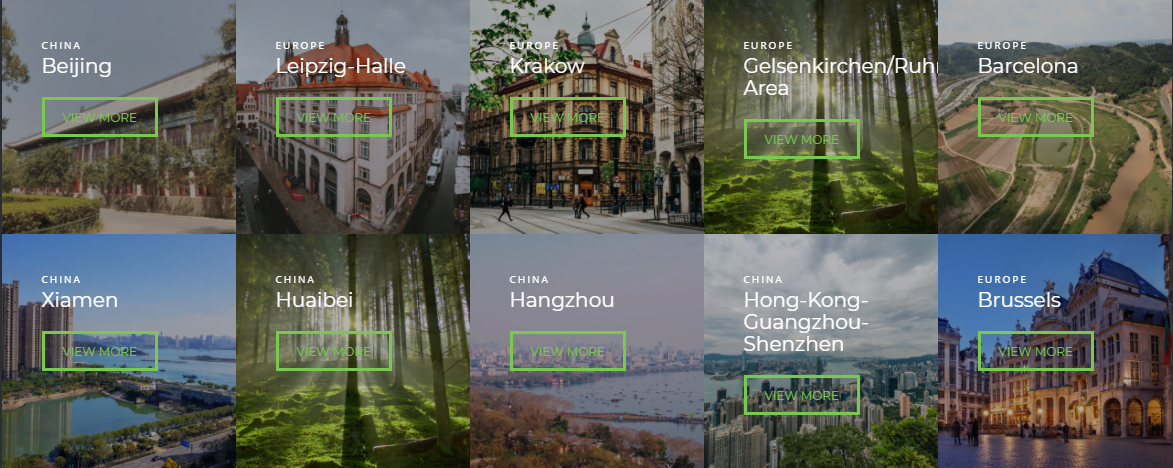
This is a guest blog from CLEARING HOUSE H2020.
The CLEARING HOUSE project is a 4-year H2020 project that will analyse and develop the potential of urban forests as providers of nature-based solutions (UF-NbS) in particular – across China and Europe using 10 city case studies.
The project will compile, review and connect the existing knowledge on developing, managing and monitoring UF-NbS. It will also analyse governance, institutional and economic frameworks, as well as public perceptions and demands in China and Europe. During the project, the partners will facilitate a collaborative learning process on UF-NbS connecting practitioners, businesses, policymakers and scientists from China and Europe to generate and apply new knowledge on UF-NbS.
CLEARING HOUSE will also develop decision support tools and guidelines for cost-effectively governing and managing NbS in general, and UF-NbS in particular, for enhancing urban resilience and human wellbeing, and has an overall goal of increasing awareness of the benefits of NbS and UF-NbS.

CLEARING HOUSE has 10 case studies across Europe and China. The European case studies are Barcelona, Brussels, Gelsenkirchen, Krakow and Leipzig-Halle. Their experiences will be shared and compared with those of Beijing, Hangzhou, Hong Kong – Guangzhou – Shenzhen, Huaibei, and Xiamen in China.
CLEARING HOUSE and COVID-19
During the COVID-19 pandemic and resulting quarantine, the importance of access to green spaces was clearer than ever. The partners decided to adapt their work plan and launched a new line of reflection and research with the objective to look at how the COVID-19 pandemic was changing both the professional perspective and citizens’ attitude on green spaces and urban forests. A survey was launched and showed that, although people feel less safe outside, generally they aim to spend more time in urban green spaces (more detailed findings can be read here).
The project partners and guests contributed to the CLEARING HOUSE COVID Blog to discuss related topics and project results. The first article of the series sets the groundwork and describes the increased recognition of the role of urban green spaces and the challenges (mental and physical) that quarantine brought to those that don’t have access to a park or garden. The theme of access to green spaces runs throughout many of the articles, as the varying levels of accessibility illustrate differences in equality amongst citizens. It is clear that people from underprivileged backgrounds, higher social classes, and even royalty do not have the same concerns when trying to escape their homes for a while, a fact that was brought into sharp focus during quarantine. On the other hand, some articles focused on the message of resilience and described initiatives that honour those who played an important role in keeping us safe during the pandemic.
Stories from countries around Europe and beyond are included in the series, including accounts from Poland, Belgium, Germany, Spain and Canada. The format of each article was up to the author, sometimes presenting the findings of a study, the outcomes of a co-design workshop held by the project, and through the art of poetry!
Even during this difficult and constantly evolving situation, the CLEARING HOUSE partners are looking forward to continuing working together in order to enhance the resilience of cities facing major ecological, socio-economic, and human wellbeing challenges.
The CLEARING HOUSE project gathers 26 partners in Europe and China, and will provide evidence and tools that facilitate the mobilisation of the full potential of urban forest-based solutions (UFBS) for rehabilitating, reconnecting and restoring urban ecosystems.
 If you enjoyed reading this blog visit the CLEARING-HOUSE website for the full series and subscribe to the CLEARING HOUSE newsletter.
If you enjoyed reading this blog visit the CLEARING-HOUSE website for the full series and subscribe to the CLEARING HOUSE newsletter.
Contact: hello@clearinghouseproject.eu
Find us across online platforms: https://linktr.ee/clearinghouse_h2020
